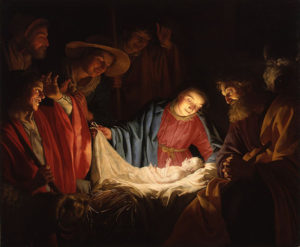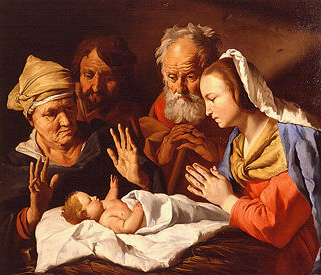“I believe in … the resurrection of the body and the life everlasting.”
– (Apostles’ Creed)

Resurrection of Christ by Noël Coypel, 1700.
As reflected in the 2014 movie, Heaven is For Real, and the 2012 book Proof of Heaven, stories of near death experiences and the survival of the human soul have found a positive reception in 21st century American culture. Even as belief in God and participation in organized religion continues to decrease, more persons believe in an afterlife now than did in 1972 (80% vs. 73%), according to a study conducted by three universities (San Diego State, Florida Atlantic, and Case Western Reserve). If one were under any illusion that belief in heaven was a uniquely Christian tenet of faith these findings should challenge that perspective.
Like persons of the present day, many in Jesus’ time believed in an afterlife and thought it possible for the souls of the departed to return from the realm of the dead to this world as ghosts. What they did not expect was God’s resurrection of Christ and his walking among the living with a body through which he could interact with the material world.
Our Moravian Easter Liturgy opens with the words, “The Lord is Risen!” This distinctly Christian message of hope is the original Gospel – “good news” – spread by apostles who had encountered the risen Christ and could testify to his resurrection. Indeed, being a witness to Christ’s resurrection was the criteria for being an “apostle” (Acts 1:22). So we read of the Apostle Peter proclaiming: “you killed the Author of life, whom God raised from the dead. To this we are witnesses.” (Acts 3:15). Similarly, the Apostle Paul writes: “Last of all, as to one untimely born, he appeared also to me.” (1 Corinthians 15:8).
Throughout subsequent centuries, followers of Jesus have proclaimed that, just as God raised Jesus from the grave, so God “will also give life to our mortal bodies if the Spirit of God has dwelt in us”. This affirmation is expressed in the Apostles’ and Nicene Creeds.
Why does belief in the resurrection matter?
Like belief in God’s Incarnation in the person of Jesus Christ, Christian belief in bodily resurrection affirms the essential goodness of nature and embodied human existence. While taking seriously problems of suffering, sin, and death, the goal of Christian faith is not to escape earthly existence but rather to open ourselves to God’s ongoing acts of redemption. Because God’s plan is to redeem this world, our task is to help God in this endeavor by becoming agents of transformation ourselves rather than simply enjoying life or passing time until we depart for a better place. We work with our Savior for justice and righteousness during our earthly lives and pray as he taught us: “your will be done on earth as it is in heaven”. With Job we can claim: “For I know that my Redeemer lives, and that at the last he will stand upon the earth; and after my skin has been thus destroyed, then in my flesh I shall see God.” (Job 19:25-26).
Pastor Derek French




